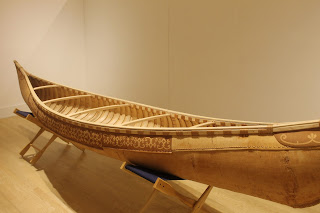Link to photos here
http://blog.ravenwoodcanoes.com/2015/06/early-guide-canoe-from-maine.html
The van snags another one, this time from Maine on a family trip to visit relatives. Found on a whim looking on Craigslist a week prior to leaving, this canoe exhibited features identifying it as a very early canoe, seemingly from the era when cedar canvas construction began to overtake birchbark constructionnd drew its influences from the former.
The boat came from a family camp purchased by the sellers Grandfather in 1925, with the original lease on the property dating to 1895. All that is known is that the boat was at the camp in 1925 and had been for some years. Best guess at the WCHA annual assembly this summer was a build date of approximately 1895, or thereabouts. The boat has features common with EH Gerrish canoes, such as the deck and seats, and has ribs taperd in width as well as thickness after the turn of the bilge like an EM White, though isnt thought to have been built by either.
A true survivor, it survived hard use and rot by living high in the rafters for years. It also managed to avoid fiberglass, and appears to be in its original canvas. Aside from some stem damage, it displays the usual alligatored varnish and cracking canvas paint, along with gunwale caps that had been crudely done.
More photos to follow of the boats specific details.
18 feet long
Heavy tumblehome evident
Full,deep ends and a low, wide midsection
Similar bircbark canoe
Almost its twin, remarkably similar recurve on the stems, heavy tumblehome etc. and more pictures to follow
Penobscot birch on the water, showing almost the same lines
Penobscot birch restored by Rick Nash for the Canadian Canoe Museum
Heart deck with lobes like Gerrish used
Typical Gerrish deck, courtesy Dragonfly Canoe
Woven cane seats
Early seats from a Gerrish canoe after restoration
Lapped seat pieces, rather than solid pieces
Tumblehome , bow deck and rails need repair
Stem profile like Penobscot birch canoe
Rails extend past the stems as with early eastern canoes
Ribs taper in thickness through the turn of the bilge, an EM White characteristic - apparently done by whoever built this as well, as it is not a White.





















No comments:
Post a Comment